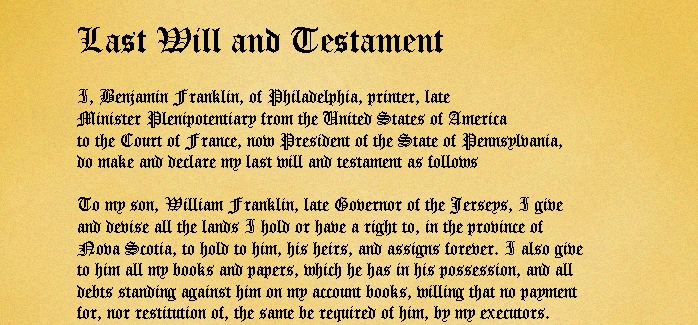Personal Digital Archiving: Digital Estate Planning

This is a bi-weekly post from staff at the Library of Congress about personal digital archiving. We recognize that public libraries have a unique function as centers of information for their communities and that their role in the spread of digital literacy is expanding. We hope that librarians and the communities they serve can benefit from our resources.
In this digital age, we now have the obligation of leaving instructions to our loved ones about what to do with our online things after we die. Just as we cherish certain old cards and letters, our loved ones would cherish some of our online writings, such as email, text, tweets, blogs, and wikis. The same goes for our online photos, videos, artwork and other things we’ve created. Some of our things will continue to exist online long after we die and some will get deleted (by hosting sites) after awhile. An industry is growing to address this so-called “digital afterlife” but basically you can get your digital affairs in order yourself. It only takes a few steps
The first is to inventory everything you have online: email accounts, Facebook, Twitter…everything. For each website, list the URL, your username and password and any additional information someone might need to access each account. Note if there is any money at stake. Do you have any virtual-world currency that might have a real-world exchange value? Do you have any money sitting in a PayPal account? Do you have a business on eBay?
The second step is to research rights issues that may block loved ones from accessing your accounts. Most sites have policies or terms of service that you agreed to, so check each site for their policy on access rights. Determine what authorization you may have to provide, if any. Some sites permit account access to heirs and some don’t; those that don’t may offer instead the option for heirs to download the deceased user’s content. Some sites delete an account if it remains inactive for awhile or if a payment is not received, so note if a site has time-related conditions. The Digital Beyond[1], an online resource for digital legacy information, compares policies for several of the top email and social media sites. It may help to designate a digital executor, someone who is Internet savvy, to carry out your instructions and, if necessary, work with the legal executors of your will. Attorneys know what they know and geeks know what they know, so get the right person for the job.
The third step is notification. Share this information with your loved ones. You don’t have to share usernames and passwords yet, just let them know you’ve written down this information and tell them where you will keep it once you print it out. A logical place would be with your will or other important papers. Also consider downloading all of your online digital possessions and backing them up with your personal digital archives. This can be time consuming but it will save your loved ones the hassle of finding your digital stuff online.
Above all, do your research. There are many digital-legacy services emerging; some might interest you and some might not. Do you want to designate an online memorial or grieving site on which your loved ones can commemorate you? Do you want to build an online avatar replica of yourself that may continue to exist after you die? Do you want to arrange posthumous email messages from you to be sent out? Maybe you can find a digital estate planning service that will take care of everything. Search online for phrases like “digital legacy,” “digital executor,” “digital afterlife,” or similar wording. Planning is tedious but crucial and your loved ones will appreciate your considerate forethought.
You can find related information and resources at digitalpreservation.gov.[2]
[1] The Digital Beyond, accessed July 31, 2013, http://www.thedigitalbeyond.com/
[2] “Personal Archiving,” Digital Preservation, accessed July 31, 2013, http://digitalpreservation.gov/personalarchiving/.












